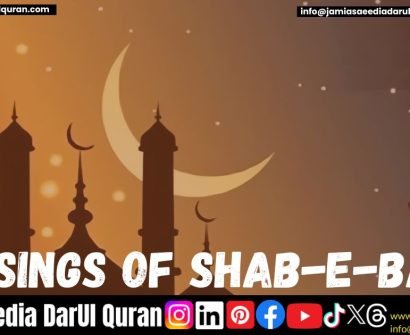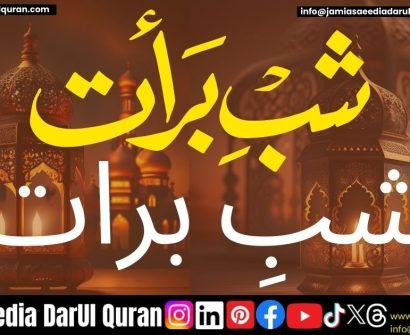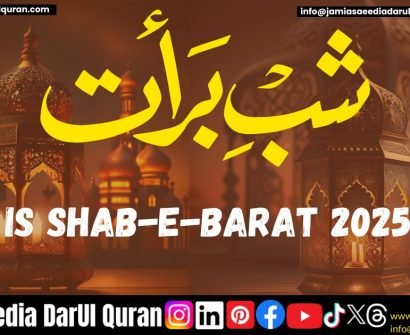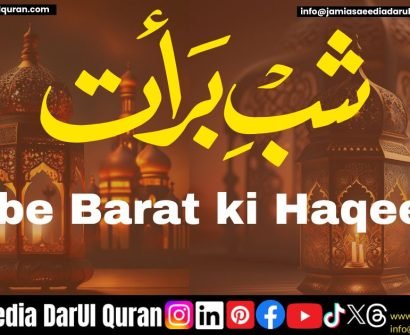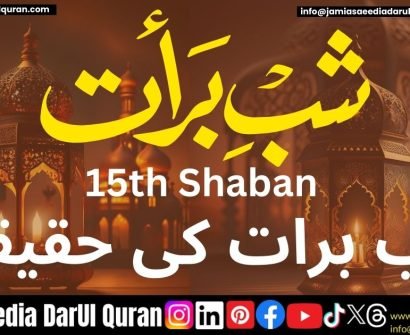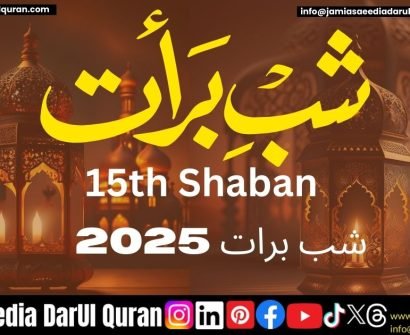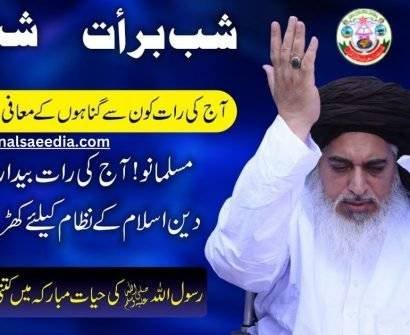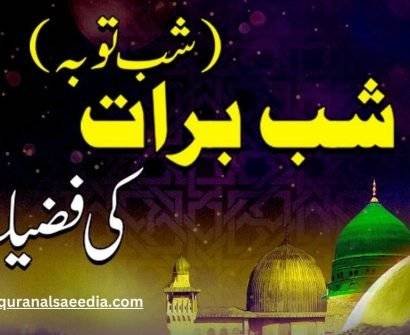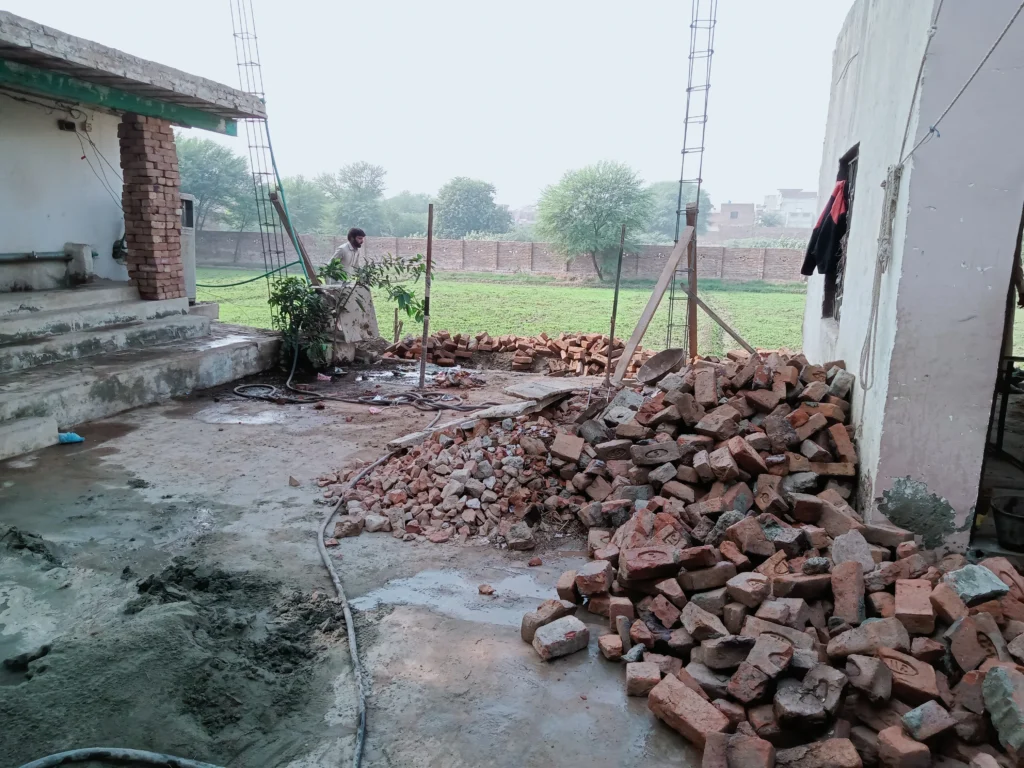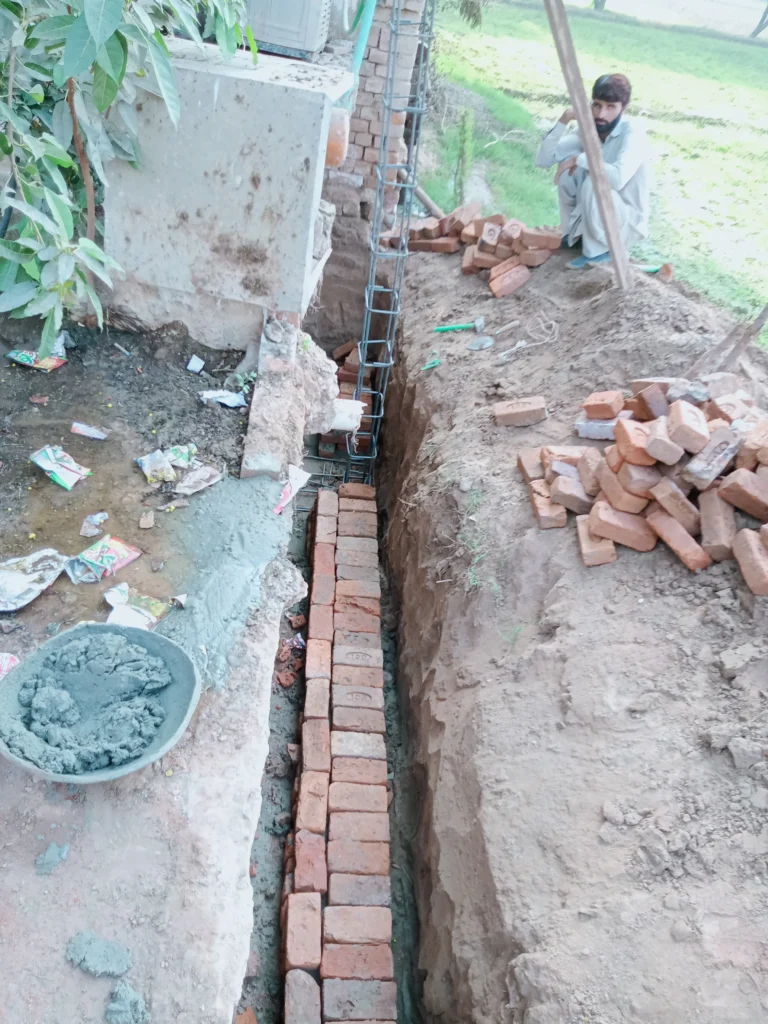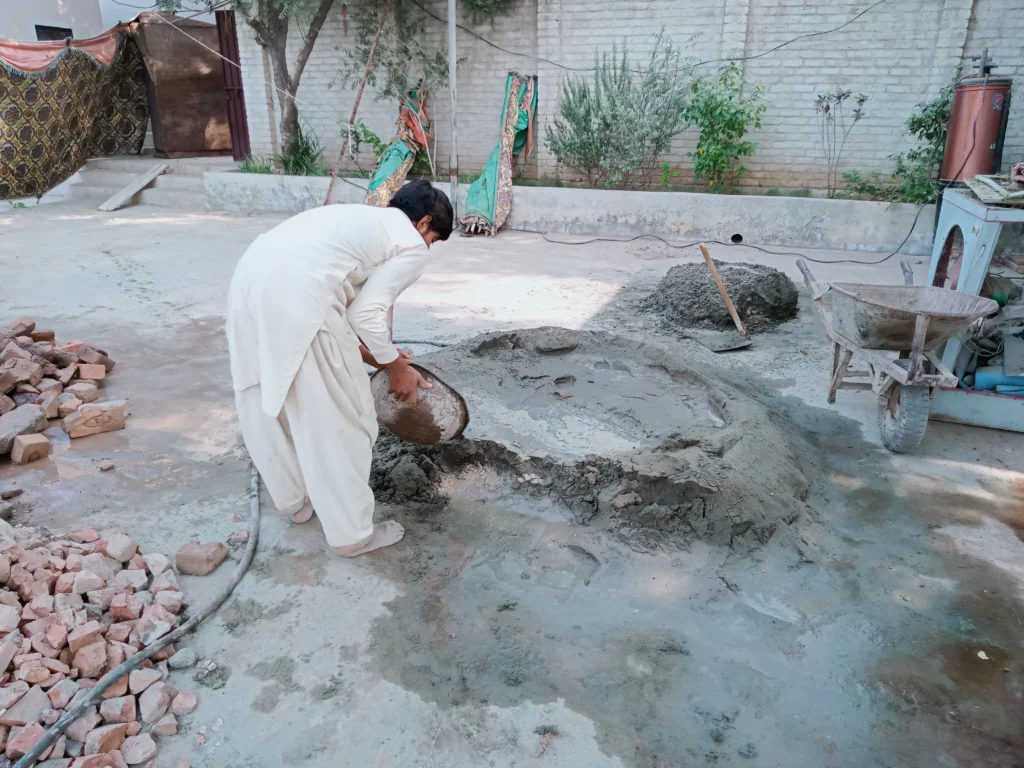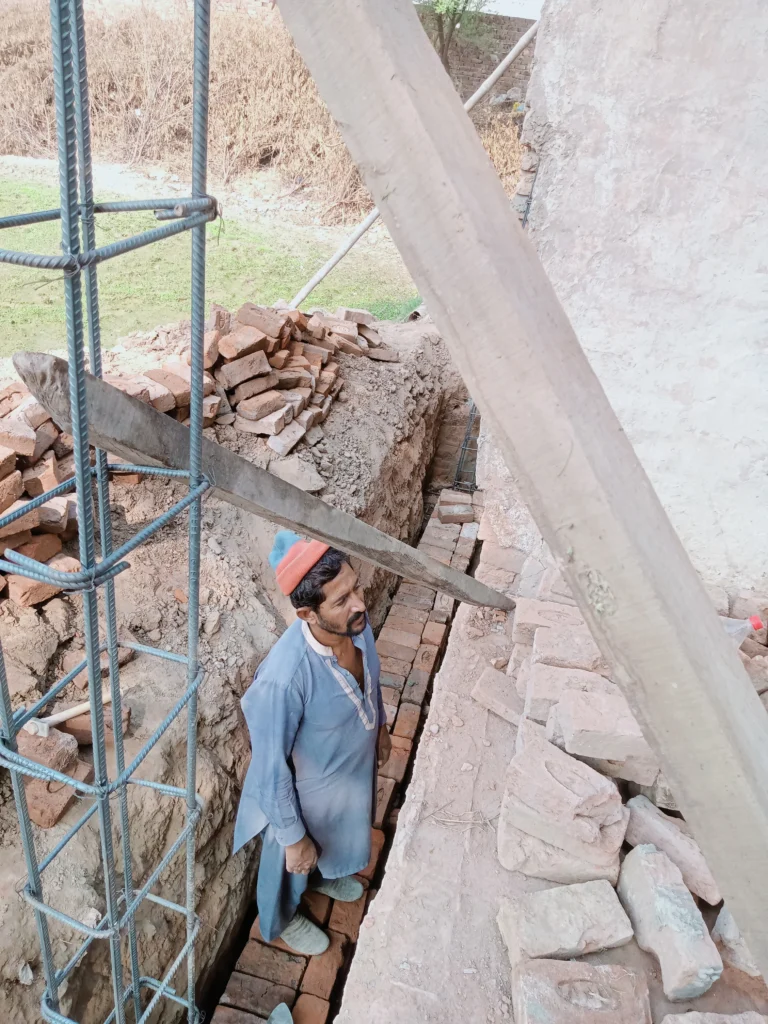Shab-e-Barat 2025: Spiritual Practices, Key Dates & Jamia Saeedia’s Night of Blessings
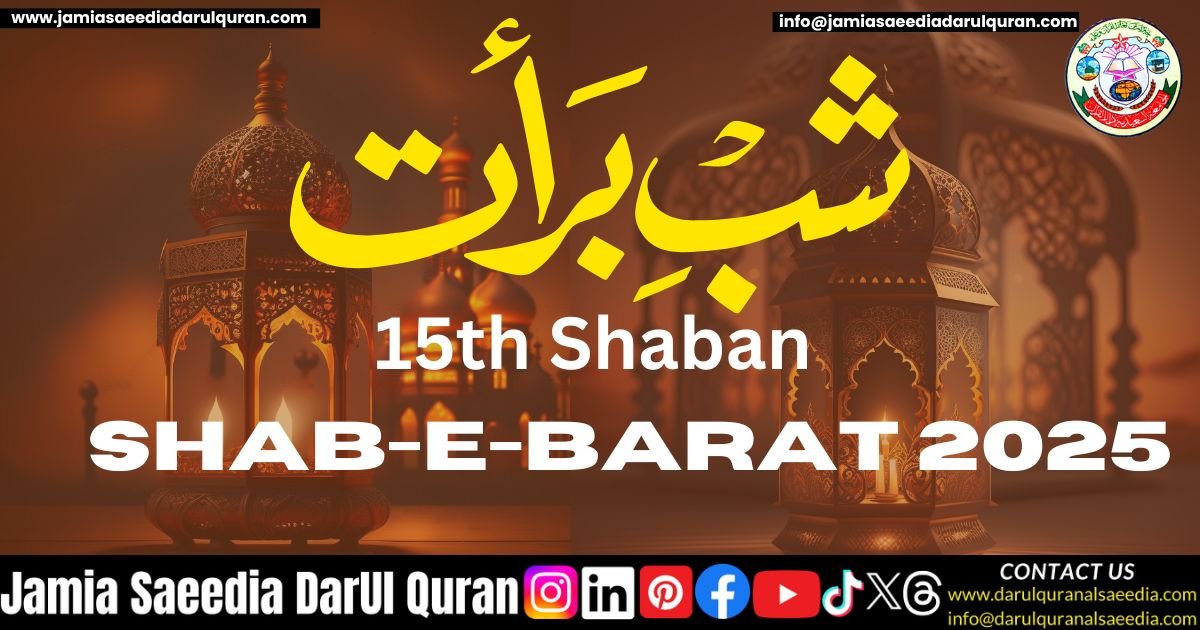
Introduction
Shab-e-Barat, also known as the Night of Forgiveness or Laylat al-Bara’ah, holds a special place in the hearts of Muslims around the world. As a child growing up in a Muslim household, I remember the anticipation and reverence with which my family prepared for this night. The aroma of traditional sweets wafting through the air, the soft glow of candles, and the hushed tones of prayers created an atmosphere of serenity and devotion. This night, observed on the 15th of Shaban, is more than just a date on the Islamic calendar; it is a time for spiritual renewal, reflection, and seeking forgiveness.
Read More: شب برات 2025
Shab-e-Barat 2025: Historical and Religious Context
The significance of Shab-e-Barat is deeply rooted in Islamic tradition and history. Although not explicitly mentioned in the Quran, various Hadiths highlight its importance. One of the most compelling narrations is from Aishah (RA), who reported that the Prophet Muhammad (PBUH) spent the night in extensive prayer, emphasizing the spiritual weight of this occasion.
Growing up, I often heard stories from my grandmother about how our ancestors observed Shab-e-Barat. She would speak of the communal gatherings where scholars would deliver sermons, and the community would come together to pray and seek forgiveness. These stories not only highlighted the religious significance of the night but also underscored the importance of community and unity in Islamic practices.
Significance and Beliefs of Shab-e-Barat 2025
The belief that Allah showers His mercy and forgiveness on this night is central to the observance of Shab-e-Barat. Muslims believe that on this night, Allah descends to the lowest heaven and forgives the sins of those who sincerely repent. This belief is not just a theological concept but a lived experience for many Muslims. I recall my father waking us up in the middle of the night to offer special prayers and recite the Quran. The collective act of worship created a sense of unity and purpose within our family.
Traditions and Practices of Shab-e-Barat 2025
The traditions and practices associated with Shab-e-Barat vary across different cultures and regions, each adding its unique flavor to the observance of this sacred night.
Prayers and Recitations of Shab-e-Barat
In my community, Shab-e-Barat was marked by extended prayer sessions and the recitation of the Quran. We would gather in the mosque or at home, and the imam would lead us in special prayers known as Nawafil. The recitation of Surah Yasin was particularly emphasized, as it is believed to hold special significance on this night. The communal aspect of these prayers fostered a sense of togetherness and shared devotion.
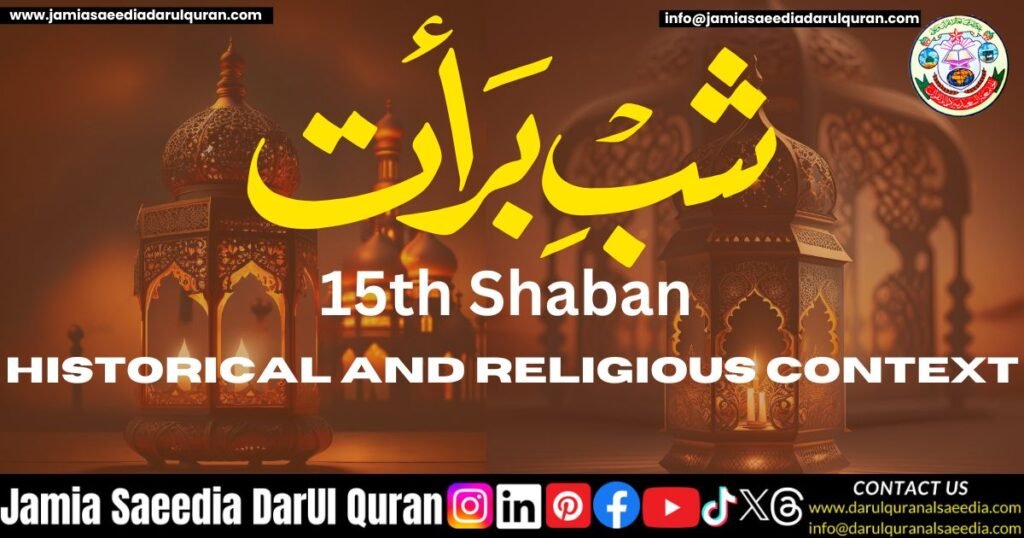
Fasting
Fasting on the 15th of Shaban is considered a virtuous act, and many in my community observed this practice. My mother would prepare a light suhoor for us before dawn, and we would break our fast with dates and water, just as the Prophet Muhammad (PBUH) did. Fasting on this day was seen as a means of purifying the soul and seeking divine blessings.
Charity
Acts of charity are emphasized on Shab-e-Barat, and my family would always make it a point to give to the poor and needy. We would prepare food baskets and distribute them among our neighbors and the less fortunate. This act of charity was not just about giving but also about fostering a sense of community and compassion.
Visiting Graves
Visiting the graves of loved ones is a common practice on Shab-e-Barat. My family would visit the cemetery to offer prayers for our deceased relatives. This act served as a reminder of our mortality and the importance of preparing for the afterlife. It was also a time to reflect on the lives of those who had passed and to seek forgiveness for them.
Community Gatherings
Community gatherings are an integral part of Shab-e-Barat celebrations. In my neighborhood, we would gather at the local mosque for communal prayers and lectures. The imam would deliver sermons on the significance of the night, and we would engage in discussions about the importance of seeking forgiveness and engaging in acts of worship. These gatherings fostered a sense of unity and shared purpose within the community.
Cultural Variations
The celebration of Shab-e-Barat varies across different cultures and regions, each adding its unique flavor to the observance of this sacred night. In South Asia, the night is often marked by the distribution of sweets and the lighting of candles. In Turkey, Muslims gather in mosques to offer special prayers and listen to religious lectures. In Indonesia, believers gather in mosques to repeatedly recite Allah’s name.
In Pakistan, Shab-e-Barat is celebrated with great enthusiasm. Muslims spend the night in prayer, reciting the Quran, and engaging in supplications. Special programs are held in mosques, where scholars deliver lectures on the significance of the night. Sweets and food are distributed among neighbors, family, and the poor.
In India, Muslims observe Shab-e-Barat by offering special prayers and reciting the Quran. They also distribute food among the needy and visit the graves of their loved ones. The night is seen as an opportunity to seek forgiveness and blessings from Allah.
Misconceptions and Clarifications
While Shab-e-Barat is highly revered, it is essential to avoid innovations or practices that are not rooted in authentic Islamic teachings. Some common misconceptions include extravagant celebrations, mandatory fasting, and the belief that the night holds more significance than other nights in the Islamic calendar.
Extravagant celebrations, such as lighting fireworks or decorating homes with excessive lights, are not in line with the spirit of Shab-e-Barat. The night is meant to be a time of reflection, worship, and seeking forgiveness, rather than a festive occasion.
Mandatory fasting on the 15th of Shaban is not prescribed in Islamic teachings. While fasting on this day is considered virtuous, it is not obligatory. Muslims are encouraged to fast if they are able, but it is not a requirement.
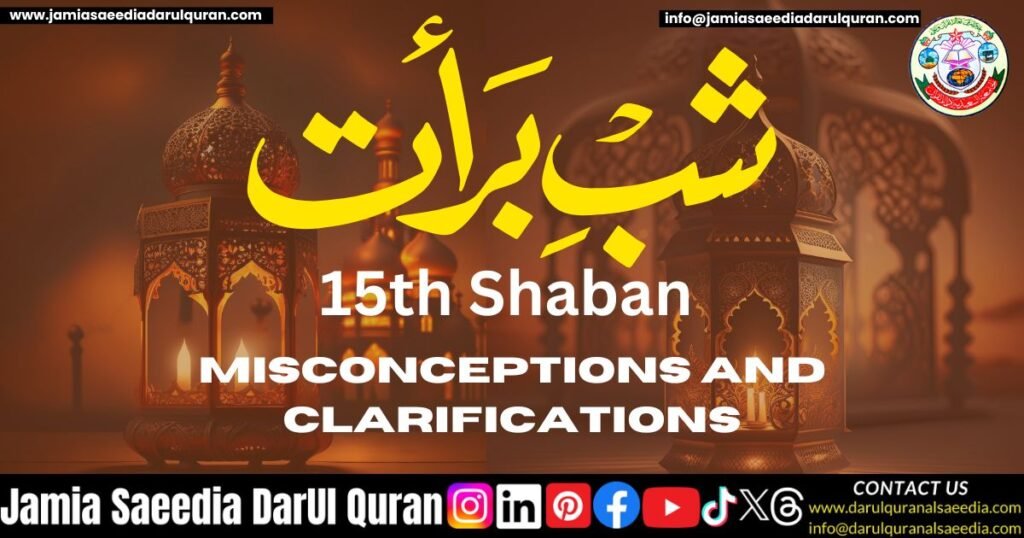
The belief that Shab-e-Barat holds more significance than other nights in the Islamic calendar is also a misconception. While the night is considered a time of divine mercy and forgiveness, it is not more important than other significant nights, such as Laylat al-Qadr during Ramadan.
Spiritual Benefits
Shab-e-Barat offers numerous spiritual benefits for Muslims. It is an opportunity to seek forgiveness for past sins, renew intentions, and strengthen one’s connection with Allah. The night is also a time to reflect on one’s actions and make amends for any wrongdoings.
Engaging in acts of worship on this night brings immense rewards. The Prophet Muhammad (PBUH) said, “Whoever stands (in prayer) on the night of the middle of Shaban and fasts the next day, Allah will forgive him his sins” (Ibn Majah). This Hadith highlights the spiritual benefits of worshipping on this night.
Preparation for Ramadan
Shab-e-Barat falls approximately two weeks before Ramadan, making it an ideal time for spiritual cleansing and preparation for the holy month. Muslims are encouraged to use this night as an opportunity to reflect on their actions, seek forgiveness, and renew their intentions to lead a righteous life.
Preparing for Ramadan involves both physical and spiritual preparation. Muslims are encouraged to fast, engage in acts of worship, and seek forgiveness in the lead-up to Ramadan. Shab-e-Barat serves as a reminder of the importance of these practices and helps Muslims to prepare for the intense worship and fasting that Ramadan entails.
The Role of Jamia Saeedia Darul Quran
Jamia Saeedia Darul Quran is an esteemed institution that plays a vital role in promoting Islamic education and spiritual growth. Every year, the institution organizes a magnificent gathering on the occasion of Shab-e-Barat, emphasizing the night’s significance and encouraging Muslims to engage in acts of worship and seek forgiveness.
Through its efforts, Jameah Saeedia Darul Quran continues to inspire and guide Muslims in their spiritual journey. The institution’s commitment to authentic Islamic teachings and practices serves as a beacon of light for Muslims seeking to deepen their understanding of their faith.
Frequently Asked Questions about Shab-e-Barat
What is Shab-e-Barat?
Shab-e-Barat is a significant night in the Islamic calendar, observed on the 15th of Shaban. It is known as the Night of Forgiveness and is a time for seeking Allah’s mercy and forgiveness.
When is Shab-e-Barat observed?
Shab-e-Barat is observed on the night between the 14th and 15th of Shaban, the eighth month of the Islamic lunar calendar.
What are the main practices on Shab-e-Barat?
Main practices include prayers, recitation of the Quran, fasting, charity, visiting graves, and community gatherings.
Is fasting on Shab-e-Barat mandatory?
No, fasting on Shab-e-Barat is not mandatory but is considered a virtuous act.
What is the significance of Surah Yasin on Shab-e-Barat?
Surah Yasin is believed to hold special significance on Shab-e-Barat and is often recited for seeking forgiveness and blessings.
How do Muslims celebrate Shab-e-Barat in South Asia?
In South Asia, Shab-e-Barat is celebrated with prayers, recitation of the Quran, distribution of sweets, and visiting graves.
What is the importance of charity on Shab-e-Barat?
Charity is emphasized on Shab-e-Barat as a way of seeking Allah’s pleasure and gaining blessings.
Can extravagant celebrations be part of Shab-e-Barat?
Extravagant celebrations are not in line with the spirit of Shab-e-Barat, which is meant to be a time of reflection and worship.
What is the role of community gatherings on Shab-e-Barat?
Community gatherings foster a sense of unity and provide an opportunity for communal prayers and lectures.
How does Shab-e-Barat prepare Muslims for Ramadan?
Shab-e-Barat serves as a reminder of the importance of spiritual cleansing and preparation for the intense worship and fasting of Ramadan.
What is the significance of visiting graves on Shab-e-Barat?
Visiting graves on Shab-e-Barat is a reminder of mortality and an opportunity to pray for the deceased.
How does Jameah Saeedia Darul Quran contribute to Shab-e-Barat celebrations?
Jameah Saeedia Darul Quran organizes annual gatherings and programs to emphasize the significance of Shab-e-Barat and encourage acts of worship.
What are some common misconceptions about Shab-e-Barat?
Common misconceptions include extravagant celebrations, mandatory fasting, and the belief that Shab-e-Barat is more significant than other nights.
How can Muslims seek forgiveness on Shab-e-Barat?
Muslims can seek forgiveness through prayers, recitation of the Quran, charity, and acts of worship.
What is the importance of the Night of Records?
The Night of Records is believed to be the night when the destinies of individuals for the coming year are decided.
How does Shab-e-Barat differ in various cultures?
Shab-e-Barat celebrations vary across cultures, with unique traditions and practices in different regions.
What is the significance of the Hadiths related to Shab-e-Barat?
The Hadiths related to Shab-e-Barat emphasize the night’s significance as a time of divine mercy and forgiveness.
How can Muslims benefit spiritually from Shab-e-Barat?
Muslims can benefit spiritually by seeking forgiveness, engaging in acts of worship, and strengthening their connection with Allah.
What is the role of reflection on Shab-e-Barat?
Reflection on Shab-e-Barat allows Muslims to evaluate their actions and make amends for any wrongdoings.
How does Shab-e-Barat help in preparing for Ramadan?
Shab-e-Barat helps Muslims prepare for Ramadan by encouraging spiritual cleansing and acts of worship.
Conclusion
Shab-e-Barat is a sacred night that holds immense significance in the Islamic tradition. Rooted in themes of forgiveness, mercy, and self-purification, it serves as an opportunity for Muslims to reconnect with Allah and prepare for Ramadan. By engaging in authentic acts of worship and avoiding misconceptions, Muslims can fully embrace the blessings of this sacred night and deepen their spiritual connection with Allah.
The night serves as a reminder of the importance of seeking forgiveness, engaging in acts of worship, and reflecting on one’s actions. It is a time to renew intentions, make amends for past wrongdoings, and strive to lead a righteous life. Through authentic acts of worship and a deep understanding of Islamic teachings, Muslims can fully embrace the spiritual benefits of Shab-e-Barat and prepare for the holy month of Ramadan.




